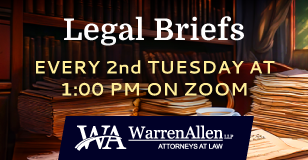By Bill Miner and Seth (Moe) Tangman
First, the bad news: Recent uptick in class action lawsuits puts manufactured home park landlords at risk of damages for technical statutory violations.
There has been an uptick in class action lawsuits filed by manufactured home tenants related to submeter or pro rata utility billings passed through from landlords. The recent spate of lawsuits seek damages for noncompliance with statutory invoicing requirements, irrespective of whether tenants were actually overcharged for utilities, or whether any invoicing deficiency is harmless.
ORS 90.560 et seq. governs a manufactured home park landlord’s ability to charge manufactured home tenants for utilities in the State of Oregon and sets forth procedures and billing requirements for submeter or pro rata utility billings to which landlords must comply. ORS 90.582(3)(a)&(b) states that if a landlord “fails to comply with a provision of ORS 90.560 to 90.584, the tenant may recover from the landlord the greater of: . . .One month’s rent; or . . .Twice the tenant’s actual damages, including any amount wrongfully charged to the tenant.” This penalty applies irrespective of whether a tenant actually suffered any overbilling damages or if the landlord’s failure to comply with the invoicing requirements were minimal and otherwise harmless.
Now the good news: The Oregon Supreme Court recently held that the proper measure of damages under ORS 90.582 is not one month’s rent for each violation; rather it’s the greater of one month’s rent or twice the tenant’s actual damages.
In Shephard Investment Group, LLC v. Ormandy, 371 Or 285 (2023), the Oregon Supreme Court was asked to determine the proper calculation of damages that may be awarded to a tenant, following multiple instances of landlord noncompliance with certain utility billing requirements that repeated each month, over a series of months. ORS 90.315 governs the inclusion of utility or public service charges such as for sewer or water service, in non-manufactured home park rental agreements. ORS 90.562 (which applies to manufactured home park tenancies) is substantially similar to ORS 90.315.
Both statutes require landlords to “disclose to the tenant in writing at or before the commencement of the tenancy any utility or service that the tenant pays directly to a utility or service provider that benefits, directly, the landlord or other tenants.” Both statutes state that a landlord “may require a tenant to pay to the landlord a utility or service charge or a public service charge that has been billed by a utility or service provider to the landlord”, also known as “pass-through” billing. However, the statutes condition pass-through billing upon a number of procedural requirements, such as billing the tenant within 30 days, setting out the utility or service charge separately from rent, and providing copies of the service provider’s bill or an opportunity to inspect it to a tenant. If a landlord engages in pass-through billing for public service charges without having met all of the conditions of the statutes, a tenant may recover “an amount equal to one month’s periodic rent or twice the amount wrongfully charged to the tenant, whichever is greater.”
In this case, the landlord brought an eviction action against the tenant to recover possession of the landlord’s premises. In response, the tenant alleged a counterclaim that landlord had failed to comply with certain utility billing requirements found in ORS 90.315(4)(b). Specifically, the tenant alleged that, over the previous year, landlord had failed to (1) timely bill him in writing for each month’s utility charges, as required under ORS 90.315(4)(b)(A); and (2) provide him with an explanation of the “pass through charges” in either the written rental agreement or separate billings, as required under ORS 90.315(4)(b)(B). The trial court agreed with tenant, concluding that landlord had committed 12 separate violations—one per month - over the 12 months within the one-year statute of limitations that governs landlord-tenant actions. The trial court awarded tenant statutory damages in an amount equal to 12 months of rent.
The landlord appealed and the Court of Appeals reversed, concluding that the plain text of ORS 90.315(4)(f) showed the legislature had not intended for each landlord billing violation to be subject to a separate sanction.
The Oregon Supreme Court affirmed with a thorough analysis, one that you may want to read, if you are so inclined. The crux of the Supreme Court’s logic is that while there may be substantive violations that are ongoing (i.e. not having specific language in a rental agreement and not placing particular language on a utility bill each month), the fact that they are ongoing is more procedural. The allegations complained of in this particular case were procedural, thus the Supreme Court held that the proper measure of damages is not one month’s rent for each violation, but there is one violation that is ongoing.
While this is a good case to address these types of claims, manufactured home park owners would be wise to reach out to their legal advisors who are well versed in manufactured home park law to review their billing practices to ensure that they are complying with the law.
Bill Miner, Partner-In-Charge Davis Wright Tremaine. Experience includes defending and prosecuting business torts; breach of contract claims; disputes between and among members of limited liability companies; residential and commercial real estate matters, including landlord-tenant, title, lien, and timber trespass disputes; and probate and trust cases.
Moe Tangman is an attorney at Davis Wright Tramaine and applies his firsthand litigation experience to help his clients find business-oriented solutions tailored to resolve their commercial and corporate disputes. He represents clients in complex commercial litigation matters, particularly with respect to real estate, corporate governance, transactions, business tort, and contract disputes. Moe also maintains a robust class-action defense practice, with an emphasis in the data privacy and cybersecurity space.

